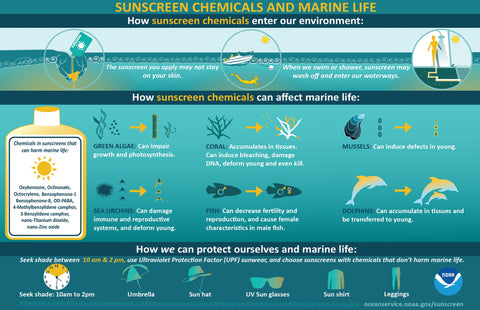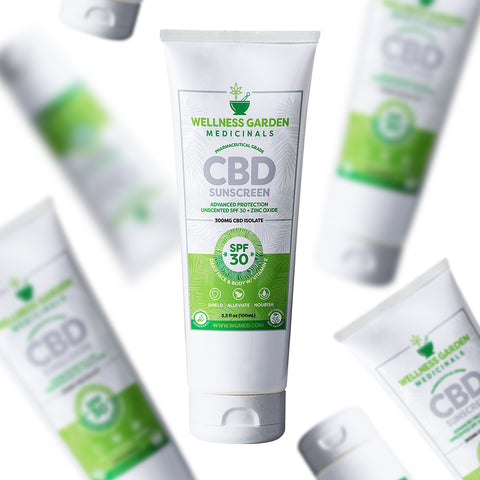CBD Sunscreen: a guide to the latest all-natural skin care product

CBD Sunscreen: the definitive guide to natural protection and sun damage repair
Cannabidiol (CBD) products are everywhere as more manufacturers have recognized its many potential benefits which include relieving pain, inflammation, anxiety, stress, insomnia, and more. But are all of these products really helping in any way, or are some just a marketing ploy?
CBD sunscreen is one such product. Most people understand that CBD is an excellent way to naturally relieve pain and reduce anxiety. Very few have found out that CBD is an excellent part of a good daily skin routine, including CBD sunscreen.
Read on to learn all about how CBD is being used as a natural ingredient in some sunscreen products which can help treat damaged skin and fight inflammation alongside other sunblock ingredients.
Why is sunscreen important?
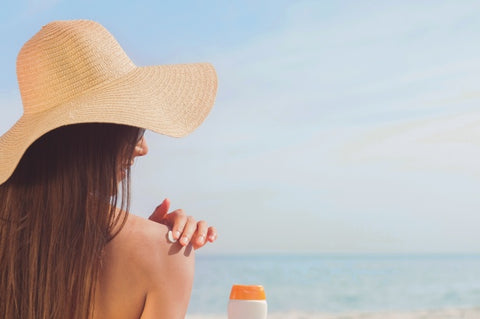
Protection from the sun is important.
Skin cancer is overall the most common type of cancer in the United States, responsible for millions of cases of per year. It is reported that 1 out of 5 Americans will develop skin cancer by age 70.
The main types of skin cancer are basal cell carcinoma (BCC), squamous cell carcinoma (SCC), melanoma, and Merkel cell carcinoma (MCC).
Basal cell carcinoma
Basal cell carcinomas (BCC) are the most common type of skin cancer and form on the outer layer of skin (epidermis) on areas typically exposed to the sun, especially the face, neck, scalp, ears, back, and shoulders.
BCCs occasionally metastasize (spread) and are rarely fatal; however, it is recommended to get them treated early.
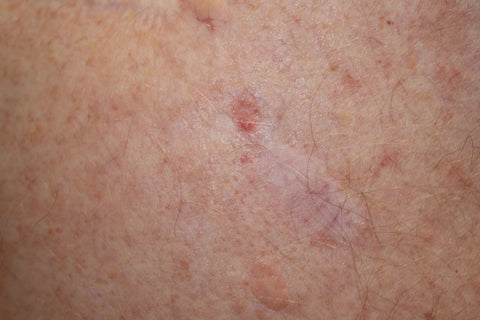
Squamous cell carcinoma
Squamous cell carcinomas (SCC) are the second most common type of skin cancer. SCCs can sometimes grow quickly and metastasize if they are not detected and treated early.
SCCs account for 1 million new cases of cancer and as many as 15,000 deaths in the United States per year.
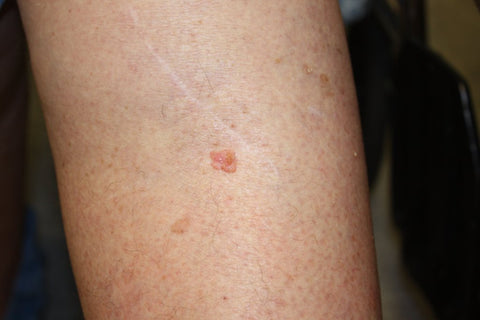
Melanoma
Melanoma is the most dangerous of the three most common types of skin cancer. In 2019, over 192,000 cases are expected to occur in the United States, about 96,000 of which will be invasive and will cause about 7,200 deaths.
Melanomas can be cured if caught and treated early. They are developed from melanocytes, which are the skin cells that produce pigment called melanin, which gives skin its color.
Melanoma is often triggered by intense, intermittent sun exposure that leads to sunburn. Using tanning beds can also increase melanoma risk.
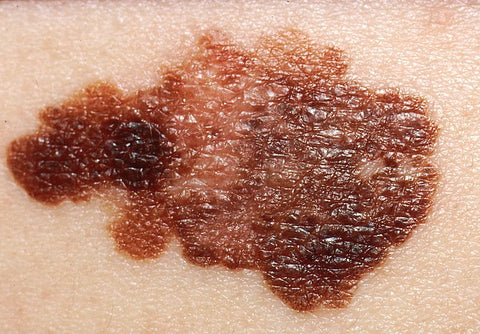
Merkel cell carcinoma
Merkel cell carcinoma (MCC) is a rare and aggressive skin cancer which usually appears as firm, painless legions or nodules on the head and neck, and frequently on the eyelids.
MCCs are believed to begin in Merkel cells at the base of the epidermis and are usually associated with a virus called Merkel cell polyomavirus. They most often occur on areas of sun exposure in fair-skinned people over age 50.
About 2,500 new cases of MCC and 700 deaths occur in the United States per year, and the numbers are expected to rise. It is crucial to detect and treat MCCs early because they are at high risk of recurring and metastasizing throughout the body.
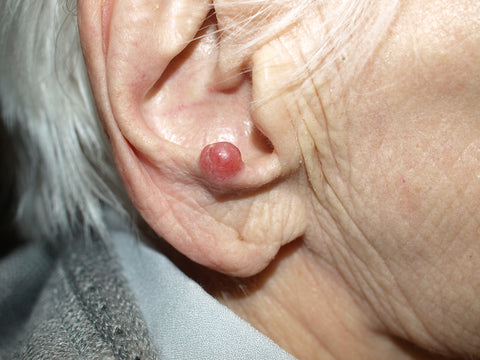
How do you protect yourself?
Besides staying out of the sun altogether, sunscreen is the best tool you can use to protect yourself from skin cancer.
NYU Langone Health Dermatologist John Zampella says “It’s a good idea to get in the habit of putting sunscreen on every day, no matter the weather.”
He encourages his patients to apply sunscreen as part of their daily skin care routine. “That’s going to give you the best long-term benefits of both skin care prevention, and also anti-aging prevention.”
Studies show that avoiding sunlight exposure at all costs is not a healthy long-term solution to avoiding skin cancer. One study found that people who avoided sun exposure tended to die earlier than those who enjoyed some sunlight.

Other research suggest that taking in moderate amounts of sunlight may help manage your circadian rhythm, control excessive weight gain, fight symptoms of depression, naturally maintain bone health through Vitamin D production, and may reduce risks of death due to cardiovascular disease, cancer, and other causes.
It seems that spending time outdoors soaking in moderate amounts of sunlight is good for your health. So how do you choose the right sunscreen to reduce the risk of skin cancer and prevent early signs of skin aging?
The best sunscreen to use
There are many types of sunscreens out there, so how do you select one that’s right for you? Dr. Amy Kassouf, a dermatologist at the Cleveland Clinic in Ohio, recommends that “the best products to use are the ones that actually get used, so it’s important you find something you feel comfortable with and putting it everywhere you will need it.”
Additionally, the American Academy of Dermatology recommends that sunbathers use sunscreen that is SPF 30 or higher, offers broad spectrum protection (protects against UVA and UVB rays), and if you are particularly active or will be sweating or swimming, you may want to find a sunscreen that is sweat-resistant or water-resistant.
What about spray sunscreen? Kassouf says they do not provide consistent and reliable coverage and advises using a different form of sunscreen to ensure better results.
How to use sunscreen
Most people only apply 25-50 percent of the recommended amount of sunscreen. Enough sunscreen should be applied to cover all exposed skin 15 minutes before going outside.
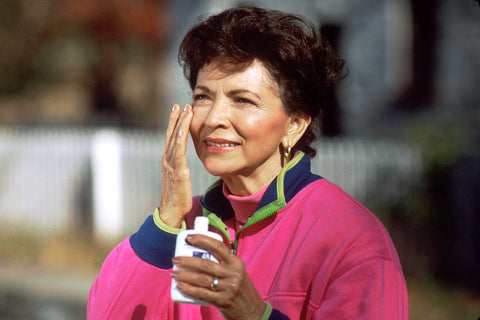
Reapply approximately every 2 hours, because SPF is only fully effective after two hours of putting it on, or after swimming or sweating, according to the directions on the bottle.
Don’t forget areas that are commonly overlooked such as the neck, tops of ears, scalp line, and edges of clothing.
What SPF should you use?
Dermatologists recommend using a sunscreen with at least SPF 30, which blocks 97 percent of the sun’s UVB (burning) rays, which are the primary cause of sunburn.
Sunscreens with a higher SPF number block slightly more of the sun’s UVB rays, but no sunscreen can completely block all of the sun’s UVB rays.
All sunscreens last the same amount of time, so you should still reapply every two hours even if you are using a higher SPF sunscreen.
Chemical vs physical sunscreen: pros & cons
Physical sunscreen
Physical sunscreen, commonly called sunblock, forms a physical shield that sits on the surface of your skin to reflect and scatter the sun’s damaging UV rays. Physical sunscreen contains mineral ingredients, such as zinc oxide or titanium dioxide.
Physical sunscreen pros:
- Protects against both UVA and UVB rays and is naturally broad spectrum
- Starts working immediately, no need to wait for protection after it is applied
- Lasts longer when exposed to direct UV rays compared to chemical sunscreen (but not during activities that make you sweat or get wet)
- Less likely to cause skin irritation or stinging in people with sensitive skin
- Deflects the heat given off by the sun, making it better for people with heat-activated skin such as those prone to rosacea or redness
- Less pore-clogging, meaning it is better for people concerned with blemishing
- Shelf life is longer than chemical sunscreen
Physical sunscreen cons:
- Can come off more easily due to rubbing, sweating, and rinsing off
- May leave a white residue on the skin, which shows more on people with deeper skin tones
- May interfere with applying makeup to the skin
- May create a layer over the skin which increases perspiration which causes the sunscreen to wear off more quickly
- Can be thicker, requiring more effort to apply evenly
Chemical sunscreen
Chemical sunscreen absorbs the sun’s UV rays and converts them into heat, which is then released from the skin. As a result, the UV rays are not absorbed into the skin. They contain one or more of the following ingredients, which create a chemical reaction when exposed to sunlight: oxybenzone, avobenzone, octisalate, octocrylene, homosalate, and octinoxate.
Chemical sunscreen pros:
- Usually thinner than physical sunscreen, making it easier to apply and to use with makeup
- Less is required to protect the skin, since there are no gaps between the sunscreen ingredients when applied to the skin
- Does not leave a white residue
Chemical sunscreen cons:
- Heat released from the chemical reaction can possibly make existing brown spots in the skin appear worse
- Requires 10 minutes to start working after it is applied
- More irritating to the skin due to the presence of multiple chemical ingredients
- Degrades faster when exposed to UV light, meaning more frequent application is required for the same amount of protection
- Heat released can cause redness and flushing, especially in people with rosacea
- Can be deadly to coral reefs if it contains the ingredients oxybenzone or octinoxate, which have been banned in places like Hawaii.
- May be pore-clogging, depending on the formula
- Can cause stinging and irritation if it gets into the eyes from sweating
Does sunscreen kill coral reefs?
The National Oceanic and Atmospheric Administration (NOAA) recently led two studies with the help of researchers and partners which showed how certain chemicals found in sunscreens threaten the health of coral reefs.
Coral reefs are one of the most valuable ecosystems on the planet, accounting for billions of dollars in food production, coastal protection services, and tourism revenue. This is why the governments of places like the U.S. Virgin Islands, Key West, Bonaire, Palau, Hawaii, and certain vacation spots in Mexico have banned reef-harming chemical sunscreens.
Oxybenzone (Benzophenone-3), a UV filter found in many chemical sunscreens, has been found to be highly toxic to juvenile corals and other marine life. The chemical has been found entering the environment through both wastewater and directly from swimmers.
Benzophenone-2, or BP-2, is a chemical used commonly in sunscreen to filter UV rays that is also highly toxic to corals. BP-2 causes colorful corals to bleach, and can cause mutation through damaging coral DNA. BP-2 is not removed from wastewater by treatment facilities and is often directly discharged into coastal waters of the Caribbean and Indo-Pacific, threatening coral reefs nearby.
Is sunscreen safe?
While using sunscreen is the number one way to reduce your risk of skin cancer from sun exposure, recent studies have called the safety of some of active ingredients found in common sunscreen products into question.
Recent research published by the Journal of the American Medical Association (JAMA) says that the following drugs used in over-the-counter sunscreen are absorbed in the blood:
- Avobenzone
- Oxybenzone
- Octocrylene
- Ecamsule
The researchers say that the levels present in the blood should require the FDA to require further safety testing according to their regulations.
The study also found that the concentration of chemicals increased over time as the study participants applied sunscreen over a four day-period, meaning the chemical levels build up over time.
There were also chemicals found in the blood after sunscreen use was discontinued.
Experts claim that sunscreen users should not fear. Dr. Tanya Nino, a dermatologist with St. Joseph Hospital in Orange, California says, “There is currently no evidence that sunscreen ingredients currently approved by the FDA cause harmful effects.”
Even so, the FDA is calling for more safety data on the following 12 ingredients before determining whether they can be considered “generally recognized as safe and effective” (GRASE):
Ingredients commonly used in the U.S.: ensulizole, octisalate, homosalate, octocrylene, octinoxate, oxybenzone, avobenzone.
Ingredients not frequently used in the U.S.: cinoxate, dioxybenzone, meradimate, padimate O, sulisobenzone.
If you are concerned about the safety of any of these chemicals, you can use sunscreen that contains the following ingredients which are currently classified GRASE:
- Zinc oxide
- Titanium dioxide
Does CBD have SPF?
While CBD does not likely have any UV protection qualities, that does not mean adding it to sunscreen is a bad idea due to its anti-inflammatory and effects on the body’s endocannabinoid system (ECS) that naturally promote healthy skin.
“The most obvious benefit may be that CBD is anti-inflammatory,” says Dr. Loretta Ciraldo, founder of Dr. Loretta Skincare and one of the first dermatologists to study the sun’s effects on the skin in the 1970s.
CBD is a known anti-inflammatory agent which can help cool sunburn, which is an inflammatory response to the damage caused by the sun’s UV rays.
CBD is also an effective pain-reliever. Its natural analgesic qualities can help ease the discomfort of sunburn and let you enjoy the sun to its fullest.
Studies have also shown that CBD works with endocannabinoid system (ECS) receptors, called CB2 receptors, which are highly concentrated in the skin to regulate and manipulate the lifecycles of skin cells. This could mean that CBD is responsible for assisting in regenerating damaged skin cells, providing a more youthful, radiant look.
CBD may also have anti-cancer properties, which may help slow down the growth and spread of skin cancer associated with sunburn. One in vitro study showed that CBD may have induced programmed cell death in breast cancer cells, showing its potential as an antineoplastic gent against tumor cells. Another study with mice found that CBD seemed to decrease the expression of metastatic breast cancer cells, leading to the down regulation of tumor aggressiveness.
Choosing the right CBD sunscreen
Wellness Garden Medicinals offers a unique all-natural CBD sunscreen that was carefully formulated to provide SPF 30 protection from the sun’s UV rays while providing the anti-inflammatory, pain-relieving, skin conditioning, and potential anti-cancer properties of CBD.
Alongside the CBD present in the sunscreen is zinc oxide, which provides the bulk of the product’s SPF 30 that does not harm coral reefs or get absorbed into the bloodstream. The amount of zinc oxide used in the product has been carefully measured to provide adequate protection without making the sunscreen too thick or whitening.
Additional ingredients were selected for their natural skin conditioning, anti-oxidant, and regenerative properties, including:
- Virgin coconut oil
- Sweet almond oil
- Naturally refined beeswax
- Naturally refined shea butter
- Carrot seed essential oil
- Vitamin E (MT-50 full spectrum)
This CBD sunscreen is all-natural, contains no artificial fragrances or synthetic chemicals, and is safe for your family and the environment.
CBD side effects
CBD is generally well tolerated and is considered safe. However, it may cause some adverse reactions.
The most commonly experienced side effects found in studies include:
- Tiredness
- Diarrhea
- Changes in appetite and weight
CBD has drug interactions with certain medications. Speak to a medical professional about CBD prior to starting any treatment.
One mice study showed that CBD-rich extracts may cause acute liver toxicity. However, it must be noted that some the mice in the study were administered extremely large doses of the extract.
Summary: Although CBD is generally considered safe, it may cause adverse side effects like tiredness and diarrhea in some people. It may also interact with certain drugs. Speak to your doctor before trying CBD if you are taking any medications.
Tips for the CBD beginner
As CBD has become more popular due to its efficacy at treating a wide range of conditions, including pain, inflammation, anxiety, stress, and insomnia, it is available in many stores and online. It is important to know that your CBD is contaminant-free.
Find CBD from a reputable source and read the product’s certificate of analysis (COA). The COA should show the amount of CBD in the product as well as any residual contaminants from the production process.
Conclusion
Sunscreen is a crucial tool which should be used daily to reduce the risk of skin cancer from sun exposure. Consider using a CBD sunscreen which provides additional benefits such as natural anti-inflammatory, analgesic, skin regenerative, and potentially anti-cancer properties.
Is CBD Legal? CBD products derived from hemp and with less than 0.3 percent THC are federally legal in the United States. CBD products derived from marijuana are federally illegal, but are legal under certain state laws. Check your local laws and the laws of anywhere you travel with CBD. Note that non-prescription CBD products are not FDA-approved, and may be inaccurately labeled. All Wellness Garden Medicinals products are made from U.S. hemp and contain 0% THC, which means they are federally legal in the United States.

